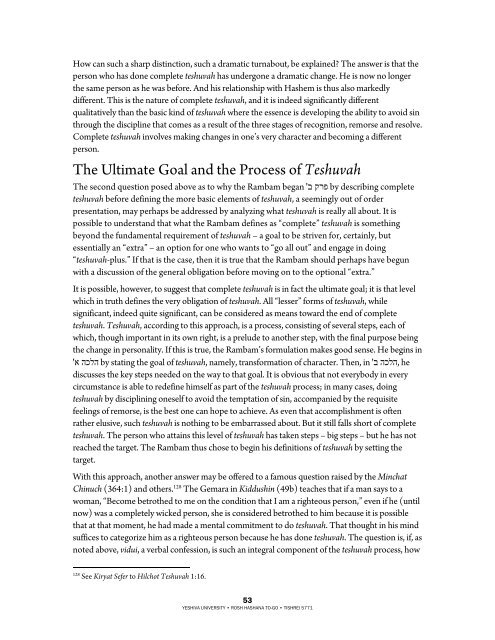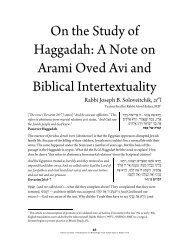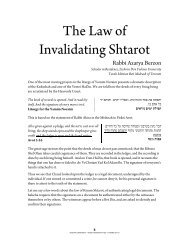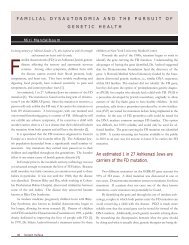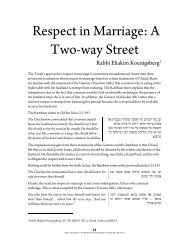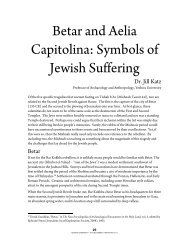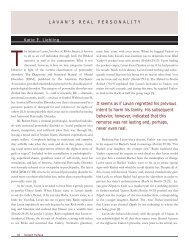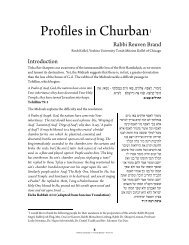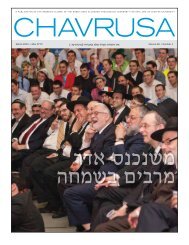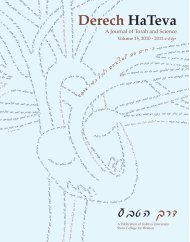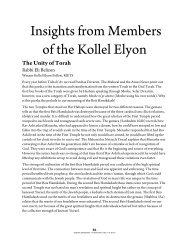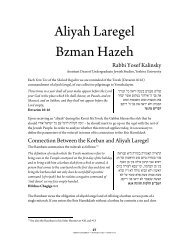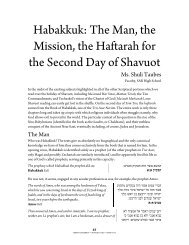YESHIVA UNIVERSITY • ROSH HASHANA TO-GO ... - YUTorah.org
YESHIVA UNIVERSITY • ROSH HASHANA TO-GO ... - YUTorah.org
YESHIVA UNIVERSITY • ROSH HASHANA TO-GO ... - YUTorah.org
Create successful ePaper yourself
Turn your PDF publications into a flip-book with our unique Google optimized e-Paper software.
How can such a sharp distinction, such a dramatic turnabout, be explained? The answer is that the<br />
person who has done complete teshuvah has undergone a dramatic change. He is now no longer<br />
the same person as he was before. And his relationship with Hashem is thus also markedly<br />
different. This is the nature of complete teshuvah, and it is indeed significantly different<br />
qualitatively than the basic kind of teshuvah where the essence is developing the ability to avoid sin<br />
through the discipline that comes as a result of the three stages of recognition, remorse and resolve.<br />
Complete teshuvah involves making changes in one’s very character and becoming a different<br />
person.<br />
The Ultimate Goal and the Process of Teshuvah<br />
The second question posed above as to why the Rambam began ' ב קרפ by describing complete<br />
teshuvah before defining the more basic elements of teshuvah, a seemingly out of order<br />
presentation, may perhaps be addressed by analyzing what teshuvah is really all about. It is<br />
possible to understand that what the Rambam defines as “complete” teshuvah is something<br />
beyond the fundamental requirement of teshuvah – a goal to be striven for, certainly, but<br />
essentially an “extra” – an option for one who wants to “go all out” and engage in doing<br />
“teshuvah-plus.” If that is the case, then it is true that the Rambam should perhaps have begun<br />
with a discussion of the general obligation before moving on to the optional “extra.”<br />
It is possible, however, to suggest that complete teshuvah is in fact the ultimate goal; it is that level<br />
which in truth defines the very obligation of teshuvah. All “lesser” forms of teshuvah, while<br />
significant, indeed quite significant, can be considered as means toward the end of complete<br />
teshuvah. Teshuvah, according to this approach, is a process, consisting of several steps, each of<br />
which, though important in its own right, is a prelude to another step, with the final purpose being<br />
the change in personality. If this is true, the Rambam’s formulation makes good sense. He begins in<br />
' א הכלה by stating the goal of teshuvah, namely, transformation of character. Then, in ' ב הכלה,<br />
he<br />
discusses the key steps needed on the way to that goal. It is obvious that not everybody in every<br />
circumstance is able to redefine himself as part of the teshuvah process; in many cases, doing<br />
teshuvah by disciplining oneself to avoid the temptation of sin, accompanied by the requisite<br />
feelings of remorse, is the best one can hope to achieve. As even that accomplishment is often<br />
rather elusive, such teshuvah is nothing to be embarrassed about. But it still falls short of complete<br />
teshuvah. The person who attains this level of teshuvah has taken steps – big steps – but he has not<br />
reached the target. The Rambam thus chose to begin his definitions of teshuvah by setting the<br />
target.<br />
With this approach, another answer may be offered to a famous question raised by the Minchat<br />
Chinuch (364:1) and others. 128 The Gemara in Kiddushin (49b) teaches that if a man says to a<br />
woman, “Become betrothed to me on the condition that I am a righteous person,” even if he (until<br />
now) was a completely wicked person, she is considered betrothed to him because it is possible<br />
that at that moment, he had made a mental commitment to do teshuvah. That thought in his mind<br />
suffices to categorize him as a righteous person because he has done teshuvah. The question is, if, as<br />
noted above, vidui, a verbal confession, is such an integral component of the teshuvah process, how<br />
128 See Kiryat Sefer to Hilchot Teshuvah 1:16.<br />
53<br />
<strong>YESHIVA</strong> <strong>UNIVERSITY</strong> <strong>•</strong> <strong>ROSH</strong> <strong>HASHANA</strong> <strong>TO</strong>-<strong>GO</strong> <strong>•</strong> TISHREI 5771


